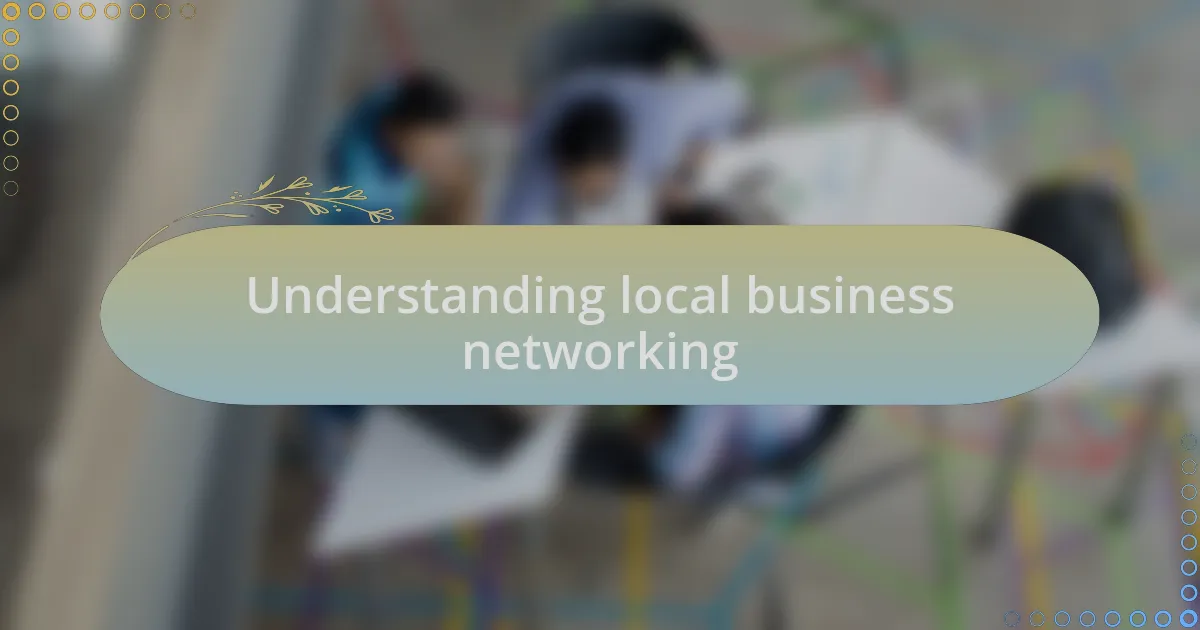Key takeaways:
- Local business networking fosters meaningful relationships that lead to referrals and mutual success.
- Referrals build trust and credibility, often resulting in high-quality leads and a supportive community.
- Personal touches, consistent communication, and a sense of belonging are key strategies for building customer loyalty.
- Measuring referral success through tracking and follow-ups helps refine networking strategies and improve conversion rates.

Understanding local business networking
Local business networking is all about building meaningful relationships within the community. I once attended a small gathering where I met a fellow entrepreneur who shared invaluable tips that directly impacted my growth. Seeing how collaborating with someone nearby could lead to mutual success really opened my eyes to the power of our local network.
Have you ever thought about how local connections can foster not just partnerships but also friendships? I remember a time when I exchanged referrals with a local café owner. Our businesses thrived together as we literally watched each other’s customers walk through our doors, proving that loyalty often grows from genuine personal connections.
When you engage in local business networking, you’re not merely exchanging business cards; you’re investing in your community. I’ve found that trust, which is built over shared experiences and conversations, can lead to referrals that feel more personal and authentic. This trust is what often transforms business relationships into long-lasting alliances.

Importance of referrals in business
Referrals are crucial in business because they embody trust and credibility. When someone refers your services, they’re essentially vouching for you. I recall a situation where a client referred me to a friend who was skeptical about my offerings. Their faith in me transformed a potential sale into an easy decision. It’s remarkable how a simple endorsement can open doors that marketing campaigns might struggle to unlock.
Moreover, referrals tend to yield high-quality leads. Personally, I’ve noticed that clients acquired through referrals often have a clearer understanding of my business and are typically more loyal. It’s like having a warm introduction instead of a cold call; they already come in with respect and trust, which significantly enhances the chances of successful collaboration.
Finally, fostering a referral-based business model often leads to a community of advocates. I remember hosting a small event where I encouraged attendees to share their experiences. The enthusiasm in the room was palpable, and by the end, several participants enthusiastically promised to spread the word about my services. This sense of community not only solidifies relationships but amplifies loyal support, making every referral feel like a team victory.

Strategies for building loyalty
Building loyalty often requires a personal touch. I remember implementing a rewards program where loyal customers could earn points for every referral they made. The excitement was electric. It wasn’t just about the rewards; it was about feeling valued and recognized for their contributions. Have you thought about how a small gesture can transform a customer’s experience into something memorable?
Another effective strategy is consistent communication. After a client referred someone to me, I’d follow up with a thank-you message. It’s surprising how such small acknowledgments can strengthen relationships. I experienced this firsthand when a client expressed their appreciation for my personal touch. In a world full of automated responses, that human connection truly makes a difference.
Lastly, creating a sense of belonging can cultivate loyalty. I once organized quarterly networking events specifically for my loyal clients and their referrals. Uniting everyone fostered a supportive network. Seeing them connect and build relationships reinforced their loyalty to my business. Isn’t it fascinating how providing a space for collaboration not only benefits them, but enhances your own reputation as a trusted resource?

Creating a referral program
Creating a referral program involves more than just a structure; it’s about crafting an experience. I once devised a tiered referral system, where customers would receive increasing rewards based on the number of referrals they made. It was amazing to see how motivated my clients became when they realized the potential for greater rewards. Have you ever noticed how a little competition can ignite enthusiasm?
One aspect that I found crucial was making the process seamless. I remember setting up a simple online form for referrals, which made it easy for my clients to participate. This ease made a big difference; I noticed a noticeable increase in participation rates. It’s a reminder that when you remove barriers, you invite more engagement, don’t you think?
Also, storytelling became a central element of my program. I encouraged my loyal customers to share their referral experiences publicly, which built authenticity and trust within our community. Once, a client shared a heartfelt story about how my services transformed their business, and it resonated deeply with potential referrers. Isn’t it interesting how personal stories can create a ripple effect, fostering a culture where referrals become a natural part of our interactions?

Personal experiences with referrals
When I first started focusing on referrals, I had one memorable moment that really underscored their power. A long-time client of mine, who had initially approached me with skepticism, referred me to her entire professional network after witnessing a significant change in her own business. I remember her email bursting with enthusiasm, almost like she was giving a glowing endorsement, which made me wonder—how often do we realize the impact of one positive experience on our ability to connect with a broader audience?
I’ve also learned that personal connections can elevate a referral into something truly impactful. One evening, I attended a local networking event and had a casual chat with a fellow business owner. I didn’t expect it to lead anywhere, but that conversation sparked a referral that ultimately resulted in a new long-term client. It struck me how a simple interaction can create opportunities, emphasizing the importance of fostering genuine relationships in my networking efforts.
Reflecting on my experiences, I’ve found that the most rewarding referrals often stem from shared values and trust. I recall a situation where another small business championed my services because we both drove home the idea of supporting local communities. That alignment not only enhanced the referral but also deepened our professional bond, proving that loyalty is often rooted in shared beliefs. Isn’t it fascinating how connections built on common ground can lead to flourishing partnerships?

Measuring success of referral efforts
Measuring the success of referral efforts can often feel like deciphering a puzzle. For me, tracking the number of new clients generated from referrals was just the beginning. I found that analyzing each referral source, whether it was a personal connection or a formal introduction, revealed patterns that helped sharpen my networking strategy. How can we refine our approach if we don’t understand what works best?
I once implemented a simple but effective method—conducting follow-up surveys with clients who came through referrals. I asked them about their experience and what made them choose my services. Surprisingly, the insights were eye-opening. Many cited the referral’s trustworthiness as a deciding factor, which highlighted the importance of maintaining those strong relationships. Who would have thought that a few simple questions could illuminate the value I was providing?
Another key metric I discovered was the referral conversion rate. By comparing the number of referrals I received to how many turned into paying clients, I gained a clearer picture of my success. I vividly recall when my conversion rate jumped after I revamped my follow-up process. This improvement not only fueled my enthusiasm but also underscored the significance of nurturing those relationships beyond the initial introduction. Isn’t it rewarding when our efforts translate into tangible success?

Building long-term relationships through referrals
Building long-term relationships through referrals requires a genuine commitment to nurturing connections over time. I remember a time when I reached out to a client who had referred several people to me. Instead of a generic thank you, I took the time to organize a coffee meeting where we could chat about their business and share insights. This simple gesture not only made them feel valued but also allowed us to explore synergies that deepened our partnership.
I believe that the foundation of loyalty lies in being proactive and attentive. After receiving referrals, I make it a point to keep the referring person in the loop, celebrating any successes that come from their introductions. One day, I messaged a referrer to share the success story of a new client I gained through them. Their excitement matched mine, and that moment reminded me of a crucial lesson: when you invest in people, they’re more likely to invest in you.
It might be easy to think that referrals are just transactions, but I see them as the beginning of a friendship. Striking up a conversation with the clients you’ve acquired through referrals shows you care about their experience. Early on, I noticed that those who received a personal touch were far more likely to turn into repeat clients. So, don’t you think the effort to foster these connections might just be the secret ingredient to building a loyal customer base?